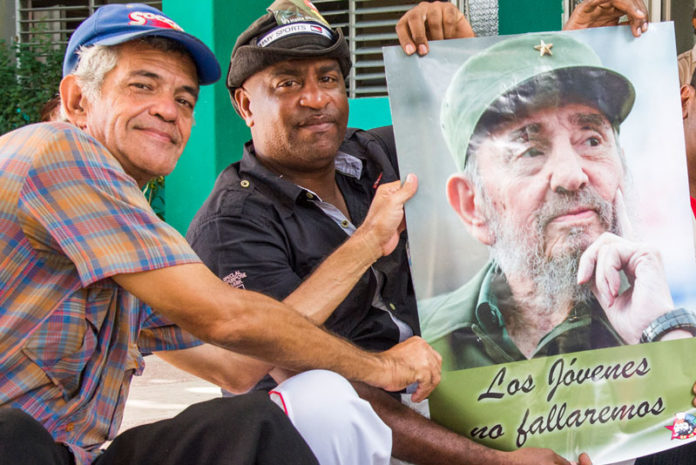A trio of Cuban-American lawmakers from Miami are outraged that they were not informed about coming regulations concerning travel restrictions to Cuba.
The lawmakers, Senator Marco Rubio and Representatives Ileana Ros-Lehtinen and Mario Diaz-Balart, all of them Florida Republicans and strong public champions of the President Trump’s more limited Cuba policy, suspected that they were being left out of the discussions or briefings on the regulations because forces within the Administration were conspiring to water down and weaken Trump’s campaign promises.
The State, Treasury, and Commerce Departments, which wrote these new rules, had never briefed these members of the Congress, and lawmakers ended up having to hear the new rules that were coming out on Wednesday morning from news outlets – an utter humiliation.
The lack of the foreknowledge is a marked shift from many months earlier, when the White House had brought the lawmakers into the fold and they had endorsed Trump’s efforts to roll back some of the Obama administration’s new détente with Havana at a June event in Miami’s Little Havana.
The trio of these lawmakers issued statements on late Wednesday that had been ranging from mild disappointments to strong dissatisfaction and blaming of the State Department “bureaucrats” from preventing Trump from going farther. They had argued the new regulations preserved too many special carve-outs for certain Cuba military-controlled hotels and existing travel plans.
“The regulatory changes announced today by Treasury and Commerce begin to implement President Trump’s 2017 policy for enforcing U.S. sanctions law against the Castro regime,” Rubio had said. “Unfortunately, however, bureaucrats in the State Department who oppose the president’s Cuba policy refused to fully implement it when they omitted from the Cuba Restricted List several entities and sub-entities that are controlled by or act on behalf of the Cuban military, intelligence, or security services.”
Rubio specifically pointed to the Gran Caribe Hotel Group and Cubanacan, two hotels that are operated by Cuban tourism companies.
“I am confident that this effort by some in the State Department to undermine the president’s directive will be addressed,” he had added.
In addition, the new list of prohibited hotels and companies did not include the Four Point by Sheraton in Havana.
Marriott International was the U.S. Company that had stood to lose the most money if Trump had included its only existing hotel in Cuba on the restricted list.
The Obama administration had granted Starwood, a Marriott subsidiary, a multi-year license with the Cuban military in 2016 to operate a hotel in Havana. Other Starwood deals involve Cuban hotels operated by the Castro government, not the military, but work on those hotels had been delayed.
Ros-Lehtinen, who is a senior member of the House Foreign Affairs Committee, and also its former chair, started out fairly positive about the new regulations, calling them to be “a positive step forward from the disastrous regulations” put forth during the Obama administration.
However, she said the regulations still fall far short.
“The carve-outs in the regulations and the acceptance of this false narrative of a Cuban private sector are disappointing,” she commented. “As the administration is examining blocking the sale of planes to Iran, it should have a uniform policy against these rogue regimes.”
She still remains to be concerned that the new Cuba regulations allow businesses with existing contractual arrangements to move forward at “the expense of the Cuban people” and had said that, “This will only assist the tyrannical regime.”
“Let me be clear: there is no truly independent private sector under a communist dictatorial regime because the regime controls all aspects of society,” she said. “We also need to resolve the matter of confiscated U.S. property claims that impacts our own U.S. national interests.”
Diaz-Balart also argued that the regulations do not fully implement what the Trump administration previously ordered.
“It is clear that individuals in the bureaucracy who support the former administration’s Cuba policy continue to undermine President Trump,” he said.
“I look forward to working with the president to ensure that his policy is fully implemented, and that the regulations are entirely consistent with his intent, unlike the ones announced today. I trust that President Trump will not allow Washington bureaucrats to stand in the way of his directive to support the Cuban people’s democratic aspirations.”
A State Department spokesperson said officials examined a “range of sources of information and the Cuban government’s own public resources and statements regarding the structure of its businesses” in determining which of these entities were to be placed on the restricted list.
“The department listed those entities with which direct financial transactions would disproportionately benefit Cuba’s military, intelligence, or security services or personnel at the expense of the Cuban people or private enterprise in Cuba, consistent with U.S. national interests,” the spokesperson had said. “Some entities controlled by the military, intelligence, or security services or personnel did not meet these criteria.”





























